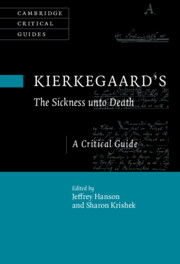Book contents
- Kierkegaard’s The Sickness unto Death
- Cambridge Critical Guides
- Kierkegaard’s The Sickness unto Death
- Copyright page
- Contents
- Contributors
- Acknowledgments
- Abbreviations
- Introduction
- Chapter 1 Kierkegaard’s Place of Rest
- Chapter 2 Publishing The Sickness unto Death
- Chapter 3 Kierkegaard on the Self and the Modern Debate on Selfhood
- Chapter 4 From Here to Eternity
- Chapter 5 Kierkegaard’s Metaphysics of the Self
- Chapter 6 The Experience of Possibility (and of Its Absence)
- Chapter 7 Sin, Despair, and the Self
- Chapter 8 Sin and Virtues
- Chapter 9 Despair as Sin
- Chapter 10 Fastening the End and Knotting the Thread
- Chapter 11 Despair the Disease and Faith the Therapeutic Cure
- Chapter 12 The Long Journey to Oneself
- Chapter 13 Accountability to God in The Sickness unto Death
- Bibliography
- Index
- Cambridge Critical Guides
Chapter 10 - Fastening the End and Knotting the Thread
Beginning Where Paganism Ends by Means of Paradox
Published online by Cambridge University Press: 26 August 2022
- Kierkegaard’s The Sickness unto Death
- Cambridge Critical Guides
- Kierkegaard’s The Sickness unto Death
- Copyright page
- Contents
- Contributors
- Acknowledgments
- Abbreviations
- Introduction
- Chapter 1 Kierkegaard’s Place of Rest
- Chapter 2 Publishing The Sickness unto Death
- Chapter 3 Kierkegaard on the Self and the Modern Debate on Selfhood
- Chapter 4 From Here to Eternity
- Chapter 5 Kierkegaard’s Metaphysics of the Self
- Chapter 6 The Experience of Possibility (and of Its Absence)
- Chapter 7 Sin, Despair, and the Self
- Chapter 8 Sin and Virtues
- Chapter 9 Despair as Sin
- Chapter 10 Fastening the End and Knotting the Thread
- Chapter 11 Despair the Disease and Faith the Therapeutic Cure
- Chapter 12 The Long Journey to Oneself
- Chapter 13 Accountability to God in The Sickness unto Death
- Bibliography
- Index
- Cambridge Critical Guides
Summary
Focusing on the Christian concept of sin, this chapter explores the way in which Anti-Climacus in Part Two of The Sickness unto Death analyzes the concepts of despair, selfhood, spirit, sin, offense, faith, paradox, and God from the standpoint of a Christian understanding of these concepts in contrast to that of classical paganism and Christendom, especially the way in which these concepts are rooted scripturally in Christianity in not willing or doing what is right rather than not knowing or understanding what one should do, as in paganism. It focuses in particular on the Christian doctrine of hereditary sin and the paradox that sin is not a negation but a position before God that cannot be comprehended but must be believed through a revelation from and relation to God, thereby creating the possibility of offense.
Keywords
- Type
- Chapter
- Information
- Kierkegaard's The Sickness Unto DeathA Critical Guide, pp. 167 - 181Publisher: Cambridge University PressPrint publication year: 2022

